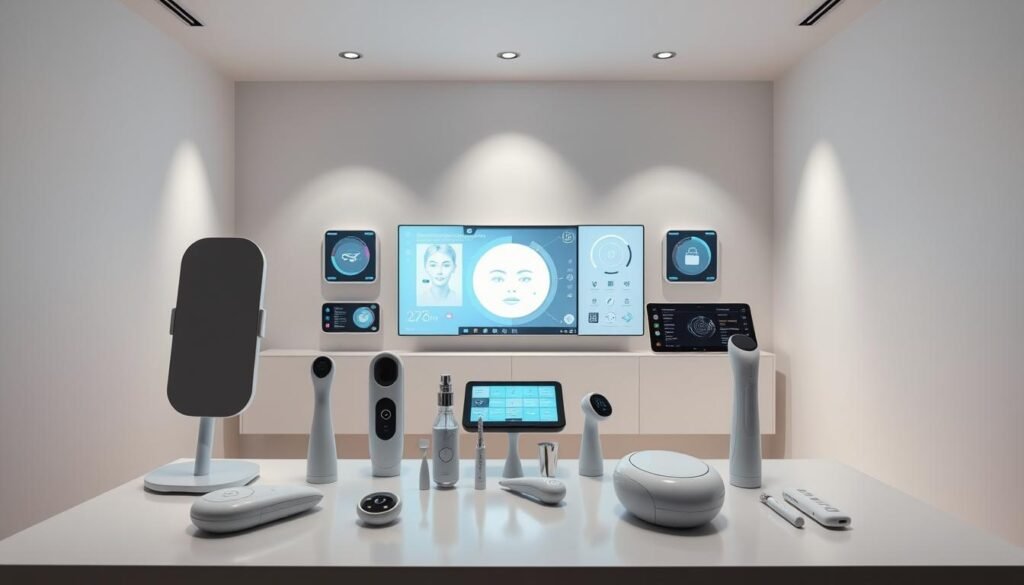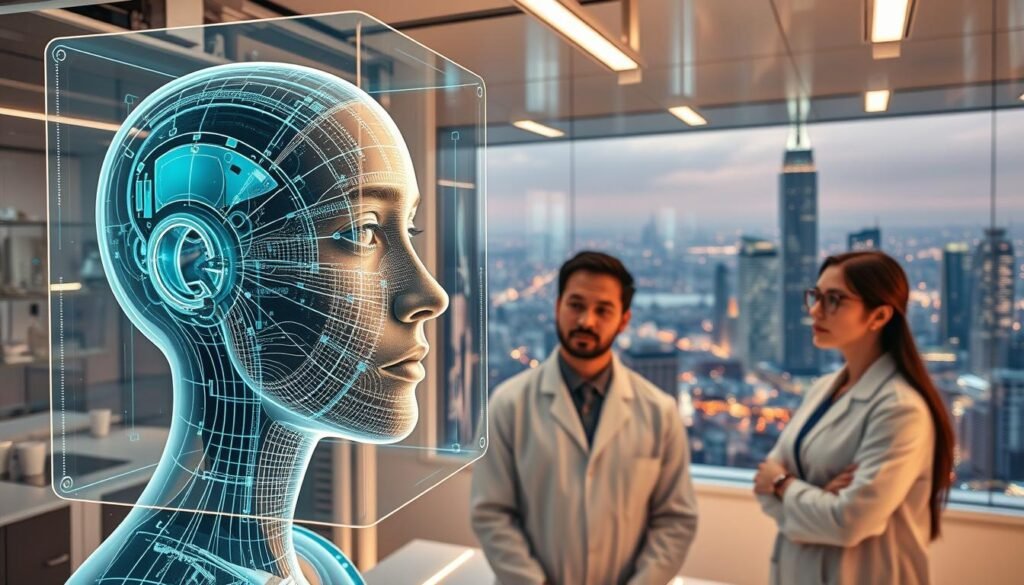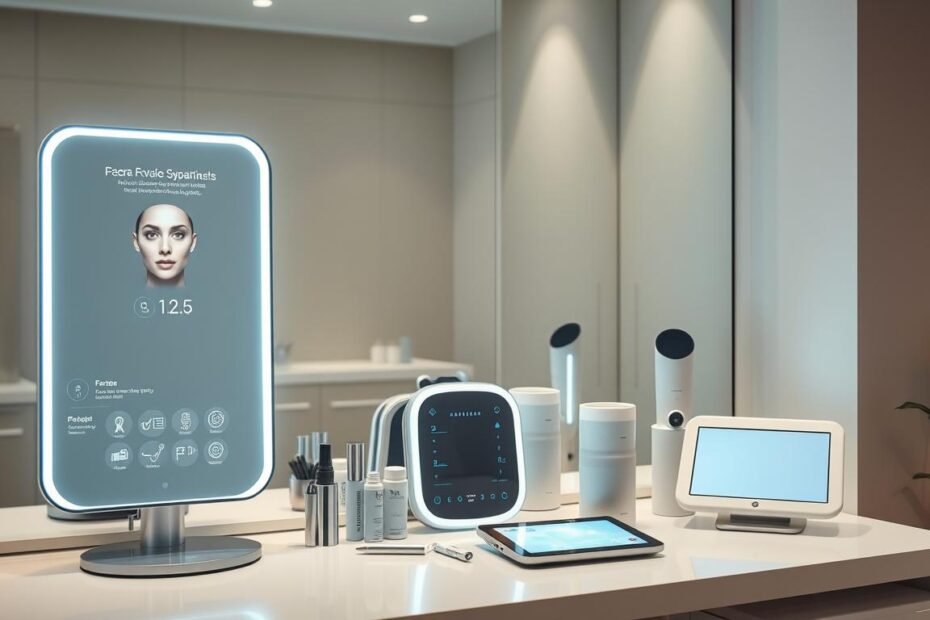The beauty industry is undergoing a significant transformation with the integration of advanced technology, revolutionizing how we approach skincare and beauty routines.
The growing trend of using AI-powered tools for personalized skincare routines is setting a new standard in the industry. With the help of smart skincare solutions, individuals can now enjoy tailored advice and product recommendations based on their unique skin types and concerns.
As we move towards beauty tech2025, it’s clear that technology will continue to play a vital role in shaping the future of beauty and skincare.
Key Takeaways
- AI technology is transforming the beauty industry.
- Personalized skincare routines are becoming increasingly popular.
- Smart skincare solutions offer tailored advice and product recommendations.
- The future of beauty is heavily influenced by technology.
- Beauty tech is expected to continue growing in the coming years.
Introduction to AI Beauty Tools
Artificial intelligence is transforming the way we approach skincare, offering personalized solutions through advanced technology. AI beauty tools are being increasingly adopted for their ability to provide tailored skincare recommendations, making them a significant trend in the beauty industry.
Apps like GlowAi and GlamAi are pioneering the use of AI in skincare by analyzing skin concerns and recommending customized products. These apps utilize advanced algorithms to assess skin conditions, providing users with personalized skincare routines that address their specific needs.
The integration of AI in beauty tools has revolutionized the skincare landscape. According to industry experts, “The future of skincare is data-driven, with AI playing a crucial role in personalizing beauty treatments.” This shift towards personalized skincare is driven by the growing demand for effective, tailored solutions that traditional products often cannot provide.
Some key benefits of AI beauty tools include:
- Personalized skincare recommendations based on individual skin types and concerns
- Advanced analysis of skin conditions using AI algorithms
- Customized product suggestions tailored to specific skin needs
As the technology continues to evolve, we can expect to see even more innovative applications of AI in the beauty industry. With the rise of advanced skincare technology, consumers are empowered to take control of their skincare routines like never before.
By leveraging AI, beauty tools are not only enhancing the user experience but also providing valuable insights into skin health. This data-driven approach is set to redefine the future of skincare, making it more accessible and effective for users worldwide.
Overview of Smart Skincare Technologies
Futuristic beauty devices are now capable of analyzing skin conditions and providing personalized recommendations. These devices are part of a broader category of smart skincare technologies that are revolutionizing the beauty industry.
Smart skincare technologies encompass a range of innovative products, from devices that analyze skin health to apps that offer tailored skincare routines. These intelligent beauty gadgets are designed to make skincare more effective and personalized.
Key Features of Smart Skincare Devices
One of the primary features of smart skincare devices is their ability to conduct thorough skin analysis. This involves assessing various skin parameters such as moisture levels, elasticity, and even detecting early signs of aging or skin conditions.
- Advanced sensors for skin analysis
- Real-time data processing for instant feedback
- Personalized skincare recommendations based on data analysis
Benefits for the User
The benefits of using smart skincare technologies are multifaceted. Users can expect a more effective skincare routine tailored to their specific skin needs. Additionally, these technologies provide users with a better understanding of their skin health over time.
By leveraging intelligent beauty gadgets, users can enjoy a more personalized approach to skincare, potentially leading to improved skin health and a reduction in the appearance of skin issues.
The Evolution of Beauty Tech Toward 2025
2025 is set to be a landmark year for beauty tech, with innovations that promise to redefine the industry. The beauty tech industry is rapidly evolving, driven by advancements in AI, AR, and other cutting-edge technologies. These innovations are not only enhancing the user experience but also providing personalized solutions that cater to individual beauty needs.
The role of AI in beauty tech is becoming increasingly significant. AI algorithms are being used to analyze skin types, conditions, and concerns, providing users with tailored recommendations for skincare routines and products. This personalized approach is revolutionizing the way individuals approach their beauty regimens.
Some of the key trends expected to shape the beauty tech industry by 2025 include:
- Advanced Skin Analysis: Technologies that provide in-depth analysis of skin health, helping users understand their skin better.
- Personalized Product Formulations: AI-driven formulations that cater to individual skin needs, ensuring maximum efficacy.
- Virtual Try-On: AR-powered virtual try-on capabilities that allow users to test products virtually, reducing the need for physical samples.
These innovations are not only enhancing the beauty experience but also making it more accessible and personalized. As the industry continues to evolve, we can expect to see even more cutting-edge beauty technology emerge, further transforming the landscape.
How AI Algorithms Personalize Skincare

Personalized skincare is becoming increasingly achievable thanks to advancements in AI algorithms. By analyzing user data and providing tailored recommendations, AI beauty tools are revolutionizing the skincare industry.
Data Collection and User Profiles
The process begins with data collection, where users provide information about their skin type, concerns, and goals. This data is used to create a unique user profile, which serves as the foundation for personalized skincare recommendations.
Key data points include:
- Skin type and concerns
- Skincare goals
- Product usage history
- Lifestyle factors (diet, stress levels, etc.)
Real-Time Analysis and Recommendations
AI algorithms analyze the collected data in real-time, providing users with actionable insights and product recommendations. This analysis is continuously updated as new data becomes available, ensuring that the recommendations remain relevant and effective.
For instance, an AI beauty tool might analyze a user’s skin condition in the morning and recommend a specific serum or moisturizer based on the analysis.
As noted by a skincare expert, “The use of AI in skincare represents a significant shift towards personalized beauty solutions, offering users a more effective and tailored approach to their skincare needs.”
“The future of skincare is not just about products, but about understanding the individual needs of each person’s skin.”
| Feature | Benefit | Example |
|---|---|---|
| Personalized Recommendations | More effective skincare | Customized product suggestions based on user data |
| Real-Time Analysis | Timely interventions | Morning skin analysis and product recommendations |
| User Profiling | Tailored skincare plans | Creating a unique profile based on user input |
Popular AI Beauty Tools on the Market
With the integration of artificial intelligence, skincare has become more personalized and effective. The market is now flooded with various AI beauty tools that cater to different skin types and concerns.
Leading Brands and Innovations
Several leading brands have embraced AI technology to revolutionize skincare. Neutrogena and L’Oréal are at the forefront, offering innovative products that utilize AI for personalized skincare recommendations.
- Neutrogena Skin360: An app that analyzes skin conditions and provides personalized product recommendations.
- L’Oréal’s Skin Genius: A handheld device that assesses skin conditions and offers tailored advice.
User Experiences and Feedback
Users of these AI beauty tools have reported positive experiences, citing improved skincare outcomes. The personalization offered by these tools helps in addressing specific skin concerns more effectively.
“Using L’Oréal’s Skin Genius has been a game-changer for my skincare routine. The personalized recommendations have significantly improved my skin health.”
The feedback from users underscores the potential of AI beauty tools in transforming skincare practices. As technology continues to evolve, we can expect even more sophisticated and effective solutions.
The Role of Skin Diagnostics
Skin diagnostics play a pivotal role in personalized skincare, leveraging AI-powered tools to analyze skin types and conditions with unprecedented accuracy. This advanced diagnostic capability is crucial for understanding individual skin concerns and developing effective treatment plans.
The process begins with understanding skin types and conditions, a task that AI algorithms accomplish with remarkable precision. By analyzing various factors, including skin texture, moisture levels, and specific concerns such as acne or hyperpigmentation, AI systems can categorize skin into distinct types and identify underlying conditions.
Understanding Skin Types and Conditions
AI-driven skin diagnostics involve sophisticated technologies that assess multiple skin parameters. This assessment is critical for creating personalized skincare regimens that address specific needs.
- Analysis of skin texture and tone
- Measurement of moisture and oil levels
- Detection of specific skin concerns like acne, aging, or sensitivity
By understanding these factors, AI can help determine the most effective skincare strategies for individual skin types and conditions.
AI’s Impact on Custom Formulations
The insights gained from AI-driven skin diagnostics are used to create custom formulations tailored to individual skin needs. This personalized approach ensures that skincare products are not only effective but also safe for individual use.
| Skin Type | Common Concerns | Custom Formulation |
|---|---|---|
| Dry Skin | Moisture retention, sensitivity | Hydrating serums, gentle cleansers |
| Oily Skin | Oil control, acne prevention | Oil-free moisturizers, salicylic acid treatments |
| Combination Skin | Balancing moisture and oil control | Lightweight moisturizers, targeted acne treatments |
As noted by a skincare expert, “The future of skincare lies in personalization, where AI-driven diagnostics play a crucial role in crafting bespoke skincare solutions that cater to the unique needs of each individual.”
“The future of skincare lies in personalization, where AI-driven diagnostics play a crucial role in crafting bespoke skincare solutions that cater to the unique needs of each individual.”
In conclusion, the integration of AI in skin diagnostics is revolutionizing the skincare industry by providing personalized solutions that are both effective and tailored to individual needs.
Integrating AI into Daily Beauty Routines
With the rise of cutting-edge beauty technology, incorporating AI into daily beauty routines is more accessible than ever. As AI continues to evolve, it’s transforming the way we approach skincare and beauty care.
AI-powered beauty tools and apps are making it possible for individuals to receive personalized skincare recommendations based on their skin type, concerns, and goals. This level of personalization was previously unimaginable in the beauty industry.
The integration of AI into daily beauty routines also involves the use of smart skincare devices that can analyze skin conditions and provide real-time feedback. These devices are equipped with advanced algorithms that can detect changes in the skin and adjust recommendations accordingly.
As we move towards beauty tech2025, it’s clear that AI will play an increasingly important role in shaping the beauty industry. By embracing AI-powered beauty tools, individuals can take their skincare routines to the next level, achieving more effective and personalized results.
The Future of AI in Skincare Industry

The skincare industry is on the cusp of a significant transformation driven by advancements in AI technology. As we move towards 2025, the integration of AI in beauty tools is expected to revolutionize the way we approach skincare.
Predictions for Beauty Tech in 2025
By 2025, AI beauty tools are predicted to become even more personalized, offering tailored skincare solutions based on individual skin types, conditions, and concerns. These advancements will be driven by sophisticated algorithms that analyze a vast amount of data, including user profiles, skin conditions, and product interactions.
Smart skincare devices will also become more prevalent, enabling users to monitor their skin health in real-time and receive instant feedback on their skincare routines. This will empower consumers to make informed decisions about their skincare, leading to more effective and efficient routines.
Ethical Considerations and Data Privacy
As AI becomes more integral to the skincare industry, there are growing concerns about data privacy and ethical considerations. The collection and analysis of personal skin data raise questions about how this information is stored, used, and protected. It is crucial for companies to prioritize transparency and security, ensuring that user data is safeguarded against unauthorized access.
Moreover, there is a need for clear guidelines and regulations regarding the use of AI in beauty tech. This includes addressing issues related to bias in AI algorithms and ensuring that these technologies are accessible and beneficial to diverse populations.
By acknowledging and addressing these challenges, the skincare industry can harness the full potential of AI to create innovative, effective, and safe beauty solutions for the future.
Challenges Facing AI Beauty Tools
Despite the advancements in AI beauty tools, several challenges need to be addressed. The integration of artificial intelligence in the beauty industry has shown tremendous potential, but it is not without its hurdles.
Technological Limitations
One of the primary challenges facing AI beauty tools is technological limitations. These limitations include data quality issues, algorithmic biases, and the need for continuous updates to keep pace with evolving skincare needs.
- Inaccurate data collection can lead to misguided recommendations.
- Biases in AI algorithms can result in unequal performance across different skin types.
- The rapid evolution of skincare technology necessitates frequent software updates.
Customer Acceptance and Trust
Another significant challenge is gaining customer acceptance and trust. For AI beauty tools to be successful, users must feel confident in the technology and its recommendations.
Building trustinvolves transparency about how data is used and ensuring that the tools provide tangible benefits.
| Challenge | Description | Potential Solution |
|---|---|---|
| Data Quality | Inaccurate or incomplete data can affect AI tool performance. | Implement robust data validation processes. |
| Algorithmic Bias | Biases can lead to unequal performance across different skin types. | Diversify data sets and regularly audit algorithms. |
| User Trust | Users must trust AI recommendations for successful adoption. | Provide clear information about AI decision-making processes. |
Addressing these challenges is crucial for the widespread adoption of AI beauty tools. By focusing on technological advancements and user trust, the industry can overcome current limitations and unlock the full potential of AI in skincare.
Conclusion: Embracing the AI Beauty Revolution
The AI beauty revolution is transforming the skincare landscape with futuristic beauty devices and intelligent beauty gadgets that offer personalized solutions. As cutting-edge beauty technology continues to evolve, it is poised to have a profound impact on the beauty industry.
Transforming Skincare with Technology
With the integration of AI algorithms and data analysis, skincare is becoming more effective and tailored to individual needs. Intelligent beauty gadgets can analyze skin conditions in real-time, providing recommendations for improvement. This level of personalization is revolutionizing the way we approach skincare.
As we look to the future, it’s clear that AI will play an increasingly significant role in shaping the beauty industry. By embracing this technology, consumers can experience more effective, personalized skincare routines that yield better results.
FAQ
What are AI beauty tools and how do they work?
AI beauty tools are devices or applications that utilize artificial intelligence to analyze and improve one’s skincare routine. They work by collecting data on skin type, concerns, and conditions, and then provide personalized recommendations for products and treatments.
How do smart skincare technologies benefit users?
Smart skincare technologies benefit users by providing personalized skincare recommendations, monitoring skin health, and detecting potential issues early on. They also offer real-time analysis and adjustments to skincare routines, making them more effective.
What can we expect from the future of beauty tech in 2025?
By 2025, we can expect to see even more advanced AI-powered beauty tools, increased integration of augmented reality, and more emphasis on sustainability and eco-friendliness in beauty products and packaging.
How do AI algorithms personalize skincare routines?
AI algorithms personalize skincare routines by analyzing user data, such as skin type, concerns, and conditions, and then providing tailored recommendations for products and treatments. They also continuously learn and adapt to user feedback and skin changes.
What are some popular AI beauty tools on the market?
Some popular AI beauty tools on the market include apps like YouCam Makeup and SkinVision, as well as devices like the Clarisonic Mia and the Neutrogena Skin360. These tools offer a range of features, from virtual try-on to skin analysis and personalized product recommendations.
How does AI impact custom formulations in skincare?
AI impacts custom formulations in skincare by analyzing user data and creating personalized product recommendations. Some companies even use AI to create custom products tailored to individual skin needs and concerns.
What are the benefits of integrating AI into daily beauty routines?
The benefits of integrating AI into daily beauty routines include more effective skincare, increased convenience, and personalized product recommendations. AI can also help users identify and address skin concerns earlier on.
What are some challenges facing AI beauty tools?
Some challenges facing AI beauty tools include technological limitations, customer acceptance, and data privacy concerns. Ensuring the accuracy and reliability of AI-powered recommendations is also a key challenge.
How can users ensure their data is protected when using AI beauty tools?
Users can ensure their data is protected by choosing reputable brands that prioritize data security, reading and understanding privacy policies, and being cautious when sharing sensitive information.
What is the future of AI in the skincare industry?
The future of AI in the skincare industry is expected to be shaped by advancements in machine learning, increased integration with other technologies like augmented reality, and a growing focus on personalized and sustainable skincare solutions.
